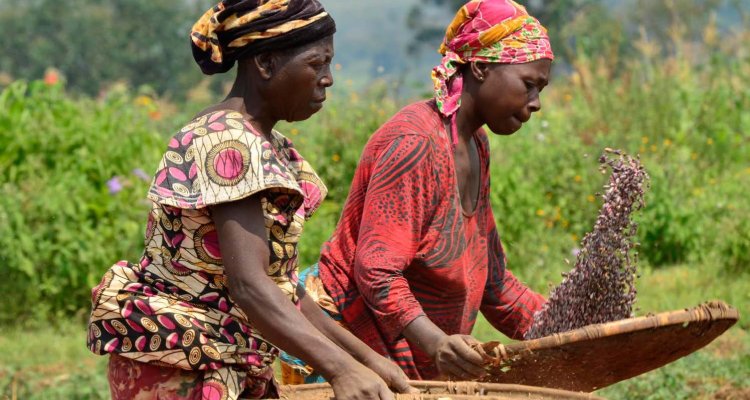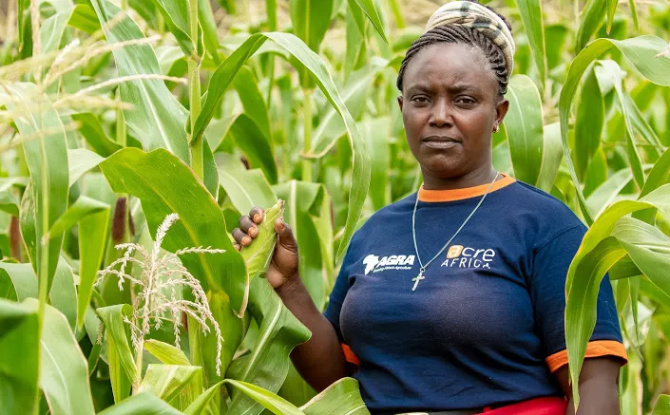
Impact story
Connecting partners across Africa to guide seed sector transformation
Ensuring access to quality seeds of varieties that farmers prefer is an essential element of any food system transformation towards sustainable production of healthy food and better incomes for farmers. The ISSD Africa Synthesis Conference in Kigali brought together professionals from across Africa to validate emergent insights for supporting the systems that deliver those vital seeds to farmers.
Take for example emergency situations, like a drought, floods, war or conflict, that are often exacerbated by the lack of seeds after the emergency, leading to food insecurity. Many interventions have tried to solve this by giving farmers seeds after an emergency, but quite often failed to achieve results due to a lack of understanding of how the seed system functions in that particular context. A new tool on how to make a proper assessment of the situation before entering into an intervention – made by Mercy Corps, SeedSystem and other partners – was discussed and validated at the ISSD Africa Synthesis Conference in Kigali, Rwanda, where it also found new users and inspired others. The tool makes a real change in how NGOs can deal with the issue of emergency seed in practice.

This is just one example out of many cases discussed by over 170 seed sector
professionals in November 2022 during the Integrated Seed Sector Development (ISSD-Africa) Synthesis Conference in Kigali. ISSD Africa is an international community of practice that brings together professionals involved in various national seed sector transformation programmes on the African continent. The programme is active since 2011, with its current phase coming to an end and there are opportunities for a next phase.
Validating insights
‘The conference was a platform for emerging insights to be shared and elaborated’, James Mulkerrins, network facilitator of ISSD Africa at Wageningen Social & Economic Research (WSER), formerly know as Wageningen Centre for Development Innovation, part of Wageningen University and Research, says. ‘It enabled attendees in interactive sessions to harvest, share and debate innovations in policy and practice.’ It brought together stakeholders from various NGOs, research institutes, governments and companies who would normally not easily meet. An important aim of the conference was to validate insights, approaches and tools, allowing them to be challenged by different people, based on their own experiences and contexts, resulting in a sharper or improved approach.
There is not one truth. There are different roads to the goal of increasing farmers’ access to quality seeds.
Marja Thijssen, coordinator of ISSD Africa at WSER adds: ‘ISSD Africa provides space for divergent perspectives. There is not one truth. There are different roads to the goal of increasing farmers’ access to quality seeds.’ The network includes people working in formal and commercial seed systems, but also those involved in farmer-managed or informal seed systems. It includes emergency seed initiatives, or those working on seed quality assurance, enabling environment, inclusion issues, public-private collaborations and a wide range of professionals who are in other ways involved in seed. We serve the whole width and bring people together.’
Real world issues
In this phase of ISSD Africa, action research is carried out by eight teams on eight different topics. The action research teams are led by specific partner organisations, who, with their own partners, align existing activities with those of ISSD Africa, guaranteeing learning from real world examples and activities. Aside from bringing their own activities, expertise and networks, partners also contribute financially to the Community of Practice. At the conference in Kigali, all teams presented and discussed their results, alongside invited strategic partner initiatives.
For example, under the topic ‘Creating demand for quality seed’ WSER and partners from the Alliance of Bioversity and CIAT shared a new innovation, a tool to forecast future seed demand. Using data on weather forecasts and political and economic indicators, staff of companies or government departments can forecast how much seed of what variety will be demanded by farmers.
And together with partners East-West Seed Knowledge Transfer, WSER also shared learning on developing farmers’ capacities on good agricultural practices. Farmers are reluctant to spend a lot of money on expensive vegetable seed, such as tomato. Training on good agricultural practices can help farmers to see how they can make a good profit from investing in high quality, but expensive seed.
Convening power
Through its focus on convening diverse stakeholders together, ISSD Africa has garnered trust from actors from across Africa’s seed sector. Apart from the ISSD Africa topic teams, many relevant organisations, including the African Union, AGRA, Oxfam and the World Benchmarking Alliance accepted the invitation to design and host their own sessions at the conference, bringing different perspectives, experiences and priorities.
Our partners value our mission to convene and facilitate learning, as well as our creative ways of working.
‘Among our partners are continental bodies, governments and research institutes from CGIAR, and they value our mission to convene and facilitate learning, as well as our creative ways of working’, adds Mulkerrins. ‘In ISSD Africa, we are less bound to publishing academic papers and are free to be creative and focus on practical practitioner-oriented products; from videos and webinars, to hands-on tools, guides and policy briefs.’
Role of Wageningen Social & Economic Research
Together with the KIT Royal Tropical Institute, Wageningen Social & Economic Research acts as the coordination unit of ISSD Africa. Mulkerrins: ‘Our main function is to support and bridge the ISSD Africa topic teams and encourage sharing and planning across the different topics. We liaise with the donor, facilitate, and organise outreach events and engage in knowledge product development.’
For the future, ISSD Africa builds directly on the conference outcomes, namely five key seed sector ambitions: boosting equity and inclusion, sector competitiveness, improved resilience to shocks and stresses, climate change adaptation capacity and strengthened food security and nutrition. Based on the conference in Kigali, key insights have been synthesised into a set of guiding perspectives for enhanced seed sector transformation in Africa. These perspectives form the basis for the Third Communiqué on ISSD in Africa.
Be careful with assumptions
Not all is what it seems, Berber Kramer warns, based on her research on last-mile seed delivery. Kramer is a senior research fellow at the International Food Policy Research Institute (IFPRI) and leads the topic on gender and seed systems within ISSD Africa. She tested a model on last-mile seed delivery businesses through village champions in Kenya. Village champions are farmers with a good network who are considered social influencers, and who sell seeds and crop insurances to other farmers.

It is often assumed that female farmers have less access to quality seeds from the formal sector, because these are often sold by male agro-dealers in town centres, and a woman often does not own a motorcycle to go to a town. Social norms may also prevent her from connecting with a male salesman as easily as it is for men. A local female village champion was expected to be a solution. Kramer’s research did show that female village champions reach slightly more female farmers than male champions. But the village champion model did not contribute to greater access to seed for women, as women appeared to find ways to access seeds in town centres anyway, for example by sending someone else.
Kramer: ‘For us the lesson was to be careful with your assumptions. Many interventions are based on standard ideas about gender roles, or on qualitative research that is then generalised. The message is that any intervention should be tested in reality before implementation.’ Kramer presented the case in the conference in Kigali. ‘It was a great opportunity to discuss this with partners in other contexts and exchange experiences.’
New tool for smarter response on emergencies
Drought, flood or conflict often disrupt the lives of farming families and their
agricultural production. A lack of seeds for farmers after the emergency can
seriously worsen the situation. Through ISSD Africa activities, Wilfred Ouko
and colleagues at Mercy Corps together with SeedSystem developed a tool for humanitarian practitioners to make wiser decisions in selecting response options, called the Seed Emergency Response Tool (SERT). Ouko is an agricultural economist and program advisor with Mercy Corps, a humanitarian aid organisation. He is also leading the ISSD Africa topics on seed sector in fragile states and on emergency seed interventions.
Ouko: ‘The tool helps practitioners to make a seed system assessment before starting an intervention. In some situations, giving away seed for free will disturb the existing seed market which will do more harm than good. Each particular situation demands for different choices on the type of seed needed and how to get it to farmers. Sometimes giving cash or vouchers is a good idea, in other situations it is not. And quality of seed and timeliness are important issues.’
The SERT tool was discussed and validated through ISSD Africa, both at the conference in Kigali and in a workshop in Nigeria. Ouko: ‘The community of practice of ISSD Africa is a platform for synergy, it really works in a great way. It gives us a much wider network and outreach, a way to learn together and it prevents duplication of work.’ In Kigali, professionals from the African Union, donors such as USAID and implementing partners gave feedback on the tool and its 10 guiding principles for seed aid practice.
Improved cooperation between community seed banks and national gene bank
Farmers have since time immemorial shared seeds among each other. Community seed banks in Uganda, through which farmers share seeds, are now cooperating in a better way with the Ugandan national gene bank. Joyce Adokorach says that a protocol was drafted to enhance this cooperation, and an online portal created to support it.
Adokorach works at the Plant Genetic Resources Centre, part of the National Agricultural Research Organisation (NARO) of Uganda, and coordinates a platform for community seed banks in Uganda. She is also involved in the ISSD Africa topic on Agrobiodiversity, seeds and climate change. ‘Together with colleagues that we met through ISSD Africa, we made a protocol to enhance the cooperation between community seed banks and the national seed bank.’ Adokorach explains that community seed banks can help increase farmers access to seeds of many varieties, but can also have a role in conservation of genetic material. This is now enhanced through better
cooperation with the national gene bank. ‘The national gene bank helped with guidelines how to operate community seed banks, which helps farmers and others to establish community seed banks.’ Also, an online platform was created of community seed banks, so that more farmers find their way to them.
Uganda is running ahead in this field, because the national seed policy of Uganda recognised the role of community seed banks in the use and conservation of genetic material. ‘Through ISSD Africa, we have been able to share our experience with colleagues from many countries and organise farmer exchanges with Kenya, Rwanda, South Sudan and countries in the Sahel.’